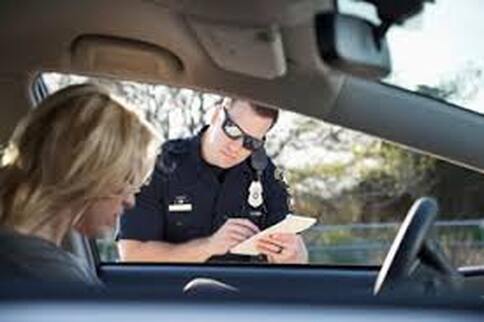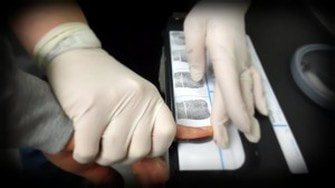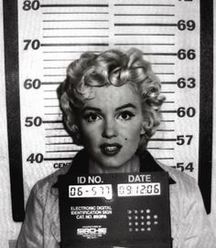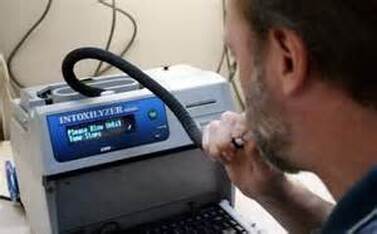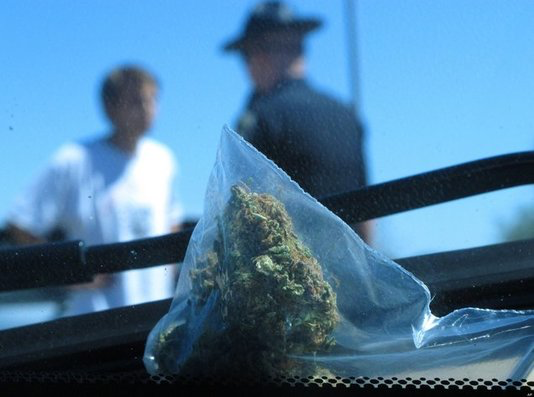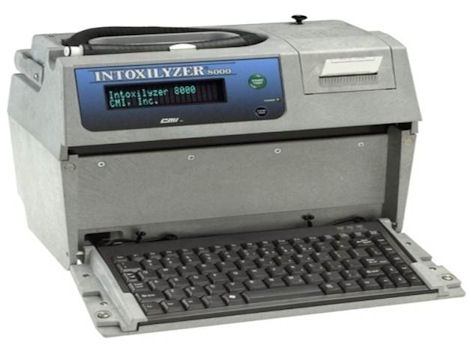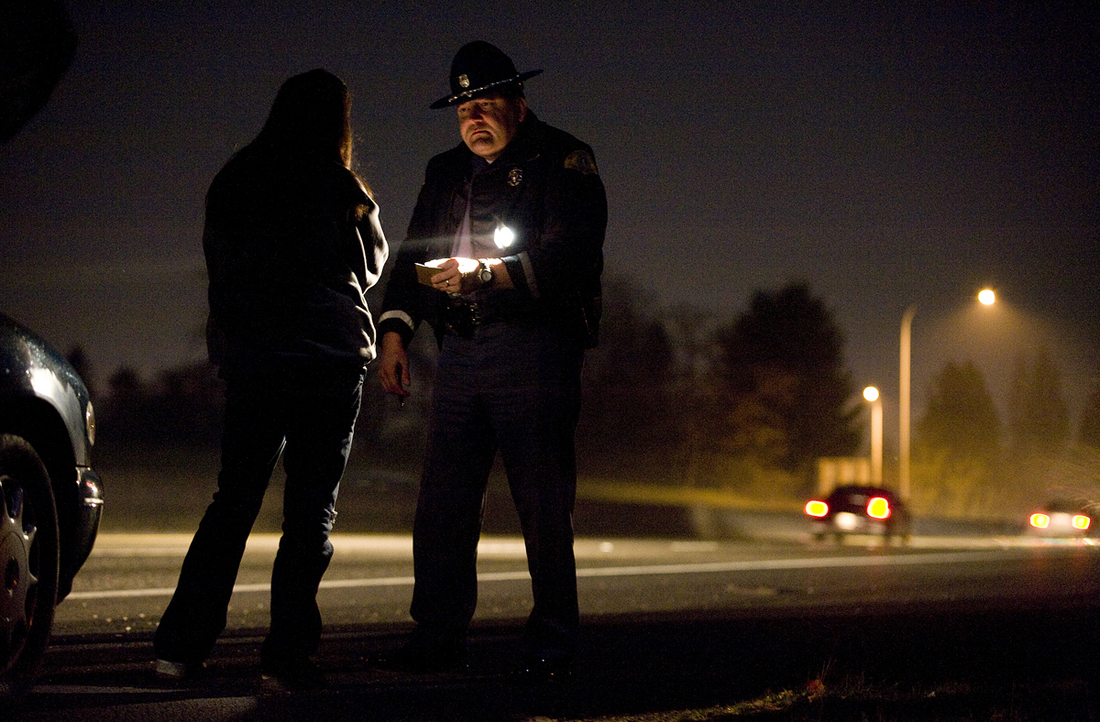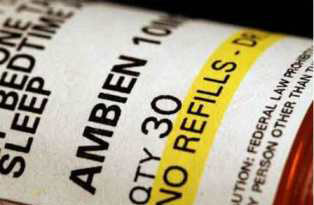|
If you have been arrested or cited for DUI, here’s what to do next. If it's been less than 10 days since your arrest or citation, file a request with DMV for an implied consent hearing. Send your request to DMV immediately, by fax, email, or online. There are no exceptions to the 10-day filing deadline. You should consider asking for an in-person hearing. You should contact an attorney to confer on your hearing request.
If a police officer gave you paperwork telling you that your license is about to be suspended, you probably will want to challenge DMV's efforts to take your license away from you. This does not commit you to any particular course of action -- but it preserves your options. Even if you don’t request a DMV hearing, unless you have a lawyer, you will have to appear in person in court on your DUI charge. This is a criminal matter, and it’s separate from the DMV case. Oregon is particularly strict in its DUI laws. Drivers and DUI attorneys from other states frequently comment that Oregon has some of the toughest DUI laws anywhere. A judge will encourage you to enter a plea of not guilty at your first appearance. This is because the judge will want to ensure you are aware of your rights and that you have the opportunity to talk to an attorney as you consider your options on how to proceed. You will not need to make any big decisions about your case for at least several weeks. In due course, the police and the district attorney will disclose the evidence in your case. During this time, you can spare yourself from endless worry by hiring an attorney who will represent you in plea negotiations with the district attorney, and at all stages of your court proceedings. A lawyer can ensure that most of your personal appearances before the court can be avoided and can advise you on the potential outcomes in your case. If you have heard about the court's diversion program, you may already be concerned about whether you should apply to enter this program. You should consider your options carefully. Take your time. Diversion may be the best move for some persons. It may be the worst move for others. For example, diversion may not be a good idea for someone with a professional license or a security clearance. It may not be the best option for a person who wants to keep a job, rent a car or travel outside of the United States. Diversion is always the worst choice when you compare it to having a case dismissed, or being acquitted at a trial by jury. If diversion is offered, your second court appearance generally is set four weeks from your first. This allows time for you to decide on whether or not you want to engage an attorney, review the police evidence, and consider your options.
DMV license suspension hearings are useful in preparing a defense in a DUI case. Your attorney can issue subpoenas that require police to bring their videos to the DMV hearing. DMV hearings provide the opportunity to cross examine the arresting officer and other witnesses, get police reports and watch videos of an arrest.
To contest a proposed license suspension, the request for a hearing must be submitted within 10 days of your arrest for DUI. Ask for a DMV license suspension hearing immediately after an arrest or citation for DUI. It's possible to contest your DMV license suspension and prevail. Get Your License Back
Request a DMV hearing immediately after an arrest or citation for DUI.
Remember: If the police took your driver's license, you have only 10 days to request a hearing on a DMV license suspension. Diversion Is a Last Resort, Not a First Resort
Diversion is a government-sponsored behavior modification program. It is administered by the probation department in cooperation with the court and private treatment providers.
Completion of the diversion program will result in a dismissal of your DUI charge. However, diversion does not remove a DUI from your criminal record. Many agencies of the federal government treat diversion like a conviction for a crime. So do other countries. If you enter diversion, you may not be allowed to enter other countries, including Canada. There may be employment consequences if you have a professional license. Professional licensing agencies may initiate inquiries and investigations regarding DUIs that were resolved in a diversion agreement.
A person charged with DUI should consider diversion as a last resort, not a first resort.
Diversion is an option that should be considered carefully. Anybody who is thinking about entering diversion should have the clear understanding that diversion is an option to be considered only when all other options have been exhausted. When you go to court for the first time, remember: You have 30 days from the date of your first court appearance to decide if you want to enter diversion. First, Look at the Evidence
The court generally sets a second hearing approximately four weeks out from your first appearance. During this time the police and the district attorney will respond to requests to release all of the evidence in your case.
The district attorney will object to diversion if your criminal and driving record shows you are ineligible for the program. In this event, the district attorney will make a plea offer. In some cases, the evidence may show that the police violated a defendant's rights, and that evidence was obtained unlawfully. Or, there may be facts in a case that should be investigated. Until all of the evidence is discovered, and all the facts are known, you are presumed innocent. You should continue to invoke your right to remain silent. Many new clients ask if there is a possibility of negotiating a plea and settling the case with a guilty plea to a lesser offense. In Oregon, the law does not permit a person charged with DUI to plead to a lesser charge. The only break available in Oregon for a first-time DUI is diversion. The worst problem with diversion is that, to take advantage of the opportunity to enter this program, a person has to plead guilty or no contest to a crime. Diversion Has Lots of Consequences and Conditions
Diversion is offered only if a defendant has had no prior DUIs in the past 15 years.
Diversion isn't easy. It's not cheap, either. And, what you do in diversion is very similar to what you have to do if you are convicted of DUI and sentenced to probation. However, there are advantages to diversion that make it attractive to a lot of people: (1) There is no possibility of jail (as long as the program requirements are completed), and (2) There is no license suspension. (This does not affect any implied-consent suspension ordered by the DMV.) A person won't lose the chance to enter diversion by asking a judge for time to talk with an attorney about the diversion option. Judges are always willing to schedule a second court appearance so that a person charged with DUI will have time to meet with an attorney and consider alternatives before accepting an offer to enter diversion. DUI Is Never Removed from Your Criminal Record
Successful completion of the diversion program will result in a dismissal of a DUI charge. However, diversion does not remove a DUI from a person's criminal record. The original charge, the plea, the court order allowing entry into diversion, and notices of compliance with the diversion program will remain permanently in the court's public records.
Many agencies of the federal government treat diversion like a conviction for a crime. So do other countries. If you enter diversion, you may not be allowed to enter other countries, including Canada. There may be employment consequences if you have a professional license. Professional licensing agencies may initiate inquiries and investigations regarding DUIs that were resolved in a diversion agreement. If a person entering diversion doesn't abide by the diversion agreement (for example, by drinking or getting arrested again for DUI), or doesn't complete the requirements of the diversion program, the court proceeds to sentencing on the guilty or no contest plea that is already entered. If the diversion agreement is revoked, penalties are imposed, including jail, fines, and suspension of driving privileges. Diversion Has Entrance Requirements
If you decide to take the deal and get into diversion, these are the requirements to enter and complete the diversion program:
(1) Plead to DUI. (2) Pay the program fee ($490). (3) Report to the Jackson County Community Justice office for an alcohol and drug evaluation. (4) Pay $150 for the drug and alcohol evaluation. (5) Enroll in a treatment program. (6) Abstain completely from alcohol and all non-prescription drugs for the diversion period (one year). (7) Install an ignition-interlock device. DUI diversion is a one-year program. If all of the program requirements are successfully completed, the criminal charge is dismissed (although it remains a part of a life-long criminal record). In a diversion, a person's criminal record will always show the arrest, plea, entry into diversion and, finally, the dismissal of the case. It is a public record. Find an Attorney Who Specializes in DUI Law
Keep in mind that many lawyers who are not specialists in this area of the law (and many judges, too) will automatically tell you that you should enter diversion before they know the first thing about your case.
Before pleading guilty or no contest to DUI or any other crime, it's best to review the police reports and talk to a lawyer. You definitely should speak with an experienced DUI specialist before you agree to enter the diversion program.
You should plead NOT GUILTY at your first court appearance on a DUI.
At your first court appearance, the judge will set a new court date, about a month out. You can use that time to get all of the discovery in your case, review it with an attorney, and make the decisions that are right for you. If you enter the DUI diversion program, the court will expect you to understand your responsibilities.
To have your DUII charge dismissed at the end of your one-year diversion period, you must do the following: Pay to the court the required diversion fees. These include a $490 program fee. Complete an alcohol and drug abuse assessment. The cost of the assessment is $150. Pay for any treatment recommended by the DUI supervisor who performs your alcohol and drug evaluation and screening, and complete the approved treatment program. Attend a victim impact panel and pay a participation fee. This program is now offered online. The fee for the victim impact panel in Jackson County is presently $50. Install an approved ignition interlock device in any vehicle you operated during the term of the diversion agreement when you have driving privileges. Pay to the provider installing the device any costs associated with leasing, installing, and maintaining the device. Comply with state laws that prohibit the use of intoxicants. Do not use any alcohol or other intoxicant during the term of the diversion agreement without the approval of the DUI supervisor. Oregon has strict state laws on boating while under the influence of an intoxicant. In many respects, they are virtually identical to laws against driving a motor vehicle while under the influence. In some ways, boating laws are more severe.
Police will consider a boater to be “under the influence” when they suspect that the boater is impaired from the consumption of cannabis, a controlled substance (including a prescription medication), or alcohol. Boating while under the influence of intoxicants is prohibited on all waterways in this state. These laws apply to boats with motors and boats without motors. There are striking similarities between the laws prohibiting boating under the influence and driving a motor vehicle while under the influence of an intoxicant. Oregon state law provides that simply by operating a boat, a person has already consented to perform field sobriety tests and chemical tests if requested by a police officer. A person is presumed to be “under the influence” if a blood alcohol level is proven to be .08 or more. When a person is arrested for boating under the influence, scheduled bail amounts range from $3,500 to $6,250. Operating a boat under the influence of an intoxicant is a Class A misdemeanor. A person who is convicted of boating under the influence can be sentenced to a maximum of one year in jail, and fined as much as $6,250. A conviction for boating under the influence counts as one of a person’s first three arrests for driving under the influence of intoxicants. All boat registrations in the name of a person who is convicted of boating under the influence will be suspended for up to three years. A person convicted of boating under the influence is not allowed to operate a boat for one year and is required to complete a boating safety course. It is a Class A misdemeanor for a person to knowingly operate a boat in violation of a court order for conviction of boating under the influence. The Oregon Court of Appeals has considered constitutional challenges to charges brought against boaters. There have been cases where boaters have successfully raised legal issues on appeal, but at the present time the statutes enacted by the legislature remain in effect. Stated simply, operating a boat while under the influence of intoxicants is a crime in Oregon. When the police allege that a person was operating a boat while under the influence of intoxicants, this person is exposed to significant legal penalties. Oregon statutes also provide that if a person refuses or fails a sobriety test, evidence of the refusal or failure may be offered in court. When someone is convicted of operating a boat while under the influence of intoxicants, the person is not eligible to apply for any certificate of title, registration, or numbering, and all certificates of title, registration and numbering necessary to lawfully operate a boat on Oregon waters will be canceled for at least one year. The marine board states that periods of cancellation or ineligibility are likely to be substantially longer if a person refuses to submit to a sobriety test. Any person who operates a boat on any waters of this state is deemed to have given consent to submit to field sobriety tests on the request of a police officer if the police officer reasonably suspects that the person has committed the offense of operating a boat while under the influence of intoxicants. If a person refuses or fails to submit to field sobriety tests evidence of the person’s refusal or failure to submit is admissible in any criminal or civil action or proceeding arising out of allegations that the person was operating a boat while under the influence of intoxicants. When the police suspect a person is boating under the influence of an intoxicant, the investigation may move quickly toward a chemical test of the person’s breath by authority of Oregon’s “implied consent” law. This law states that, simply by operating a boat on any waters in the state, “shall be deemed to have given consent to submit to chemical tests of the person’s breath for the purpose of determining the alcoholic content of the person’s blood if the person is arrested for operating a boat while under the influence of intoxicants.” The law also provides, however, that no chemical test of a person’s breath shall be given to a person under arrest for operating a boat while under the influence of intoxicants if the person refuses the request of a peace officer to submit to the chemical test after the person has been informed of rights and consequences. On the other hand, if a person refuses or fails to submit to chemical tests of breath, blood or urine, any evidence of the person’s refusal or failure to submit is admissible in any criminal or civil action or proceeding arising out of acts alleged to have been committed while the person was operating a boat while under the influence of intoxicating liquor, cannabis or controlled substances. At the trial of any civil or criminal action, suit or proceeding arising out of the acts committed by a person operating a boat while under the influence of any intoxicants, if the amount of alcohol in the person’s blood at the time alleged is less than 0.08 percent by weight of alcohol and shown by chemical analysis of the person’s breath or blood, it is indirect evidence that may be used with other evidence, if any, to determine whether or not the person was then under the influence of intoxicants. If a test result is .08 or over, a person is presumed to be under the influence of intoxicating liquor. A police officer may obtain a chemical test of the blood to determine the amount of alcohol in any person’s blood or a test of the person’s blood or a test of the person’s blood or urine, or both, to determine the presence of cannabis or a controlled substance. A test can be given when requested by a police officer and the person expressly consents to such a test. A test can be given without the person’s consent if a police officer believes that the person was operating a boat while under the influence of an intoxicating liquor, cannabis or a controlled substance and that evidence of the offense will be found in the person’s blood or urine; and the person is unconscious or otherwise in a condition rendering the person incapable of expressly consenting to the test or tests requested. Boaters also should be aware of crimes and punishments if there has been an accident. Anyone involved in a boat accident must give information and aid to any person who is injured injured person, including transportation to a hospital if treatment appears necessary or is requested by an injured person. Leaving the scene of a boating accident scene before performing a boat operator’s duties is a Class C felony, and carries a potential, maximum penalty of five years in prison and a fine of up to $125,000. Boat operators involved in an accident resulting in death, injury or property damage exceeding $2000 must report the accident to the Oregon Marine Board within 48 hours of an accident resulting in death or injury, or within 10 days of an accident causing property or equipment damage. If the operator of a boat isn’t capable of submitting an accident report, the law states that an occupant of the boat has to do it. Booking Ordered At Arraignment
When a person comes to court for a first appearance (the arraignment), the judge will direct the person to go the the clerk's window and sign a "release agreement," and to go then to the Jackson County Jail to be "processed."
Police almost never arrest or hold the people who come to the jail for booking. As soon as they have their pictures and fingerprints done, they go on their way. How Jail Booking Is Done
To be "booked," or "processed," a person who has been cited for a crime and released without being taken to the jail will have to report to the court and sign a release agreement after being arraigned on a criminal charge.
The release agreement is a promise to appear in court at the next hearing date, and an instruction to report to the jail. At the jail, a deputy takes pictures and fingerprints. A "state identification number" is assigned. The "process" generally takes less than an hour. How Booking Isn't Done
Anybody who grew up watching television will think they know what is supposed to happen when a person gets arrested for DUI. The police make a traffic stop. Then there is a flash of blinding light, and when the picture resolves, we see a mugshot of some hapless individual, holding up a sign with jail numbers.
Arrest and booking procedures have changed in Oregon. Unless the police decide (or are required otherwise) to put someone in jail, a person who is arrested and taken into custody often won't get booked after an arrest. In many cases, the police leave the arrested person in the custody of a private "detoxification facility." Police also have the discretion to release a driver cited for DUI to a responsible sober person. There are some nice police who give some of their newly-minted defendants a ride home. One way or another, most drivers who are arrested are not taken to jail and are released without being "booked." To get booked in Jackson County, you have to go to the Jackson County Jail. If you are out of custody, you will have to go see the court clerk at the Jackson County Justice Building and sign a release agreement before you go to the jail. Why You Have to Go to the Jail
It may seem that the police, who used to take the fingerprints of the people they arrested, have somehow gotten the courts to do their job for them. The sponsor of this legislation, a Multnomah County judge, told me before this measure was enacted that he was interested in tracking the success rates and the recidivism rates of persons enrolled in various DUI treatment programs. He wanted these State Identification Numbers assigned for this purpose. In the meantime, however, the courts seem to have elevated the importance of the booking statutes to a strict, new level of data collection and compliance.
It is unknown to me if any data is being compiled locally that has something to do with the stated intent of this law, which was to collect data on the success of various local treatment programs. The Official Oregon Booking Law
ORS 813.017 Arraignment; booking. When a person is arraigned on a charge of driving while under the influence of intoxicants in violation of ORS 813.010, a court shall ensure that the defendant submits to booking, if the person has not already been booked on that charge.
All Rise
The courts have viewed their role in the booking process seriously. When a defendant comes to court the first time, the judge will tell the person to report to clerk's window and then the jail. There are clerks assigned to keep track of defendants who haven't been booked. If a defendant returns to court for a second appearance and hasn't been booked, the judges don't like it.
A person who needs to be booked will present a release agreement to the deputy at the jail window. Another deputy will take photographs and fingerprints. A "State Identification Number" will be assigned. This number and the information associated with it will be stored on federal and state law enforcement databases. Your Mugshot Will Not Go Online
Until recently, photographs taken at Oregon jails were posted on the jail's website. Once photos were online, unscrupulous companies would download these pictures and post them on private "mugshot" sites. This practice was subject to many abuses (see above).
With few exceptions, Oregon jails and law enforcement agencies are no longer permitted to post photographs of suspects and defendants on their websites. Talk With a Criminal Defense Lawyer
As you have gathered, there's usually not a lot I can do about the booking process. On the other hand, if you have been arrested or charged with a criminal offense, there is absolutely no rational reason to not discuss your case with a qualified, experienced legal specialist who can help you resolve your legal problems.
If you are being investigated or prosecuted in a criminal matter, you're welcome to call.
If you have not ben convicted of DUI or participated in a diversion program within the previous 15 years, these are the typical penalties for a first conviction of DUI:
A DUI charge is a Class A misdemeanor, which means conviction carries a possible sentence of up to a year in jail and a fine of $6,250. In practically all DUI cases, the sentence is much less extreme, with a standard two-day jail sentence and a fine of $1,000 for a first conviction. In DUI cases where there has been a prior diversion or a conviction, there is no risk of additional jail time being ordered if a defendant decides to take the case to trial. If there is a conviction on a first DUI and a blood alcohol content was .15 percent or more, the fine increases. If you already have a DUI on your record, penalties increase for each subsequent conviction. These are the typical penalties for a second DUI conviction:
Like any other Class A misdemeanor, Oregon statutes provide that a first or second DUI conviction has a maximum penalty of up to one year in jail and a fine of $6,250. Home Detention
The fact is, practically no one serves actual, hard, jail time on a misdemeanor DUI.
This is because the court and the community justice office, in cooperation with the sheriff's office, have a program in place that allows persons who have been sentenced to jail to serve their time at home. When a defendant is sentenced, the court generally sets a date to report to the jail. But the court allows enough time to apply for home detention at the community justice office. The home detention program lets persons who have been sentenced to jail to continue to go to work. In the past, applicants for home detention agreed to wear an ankle bracelet continuously during the term of home detention. Monitoring is now done with an app. There's a $30 application fee and the cost of the program is $30 a day. The Work Center
In some cases, a defendant opts to do jail time rather than home detention. Some elect to go to jail because they expect to be transferred to the Work Center in Talent, where they are housed in better conditions and given the chance to earn an early release in exchange for work.
Felony DUI
Options get narrower with a third or subsequent DUI. A felony DUI conviction carries a minimum sentence of 90 days.
At this level, judges may be inclined to order a defendant remanded into custody immediately after conviction. If a person is arrested for DUI with two prior DUI convictions, there is a high level of probability that the person will be indicted by a grand jury and charged with Felony DUI. On conviction for Felony DUI, a judge is required to sentence a defendant under a law known as Measure 73. The minimum sentences on conviction for Felony DUI is 60 days. Generally a fine and other court assessments will total $2,500 or more. Additionally, a third conviction for DUI will result in the following penalties:
If a third DUI is charged as a Class C felony, Oregon law provides that conviction on this offense carries a maximum penalty of up to five years in prison and a fine of $125,000. A minimum sentence of 90 days is generally imposed on conviction for a first felony conviction for DUI. If you fail or refuse a breath, blood, or urine test, the police will take your license from you, on the spot. They will give you a long, yellow sheet of paper titled, "Implied Consent Combined Report."
This document advises that DMV is suspending your license. This long sheet of paper becomes your temporary driving permit when you sign it. Your temporary permit will remain in effect for 30 days. To challenge the license suspension, you have to request a hearing within 10 days of the date of your citation or arrest. If you challenge your suspension, you will get a hearing within 30 days of your arrest. At the hearing, if you may be able to show that the proposed suspension should not go into effect.
Of the hundreds of people who are charged with DUII and other traffic crimes in Jackson County every year, most will plead guilty. Many will plead guilty to enter diversion, thinking that if they do this, their DUI will be erased from their record at the end of a year. It may be a long time before they realize their mistake.
Others think they will be punished if they tell a judge they're innocent. Or, they believe they have to get into a court-sponsored diversion program immediately, at their first court appearance, or they will lose the chance to plead guilty and go into diversion later. Unfortunately, these assumptions are incorrect. When a defendant is sentenced, the court generally sets a date to report to the jail. But the court allows enough time to apply for home detention at the probation office.
The home detention program lets persons who have been sentenced to jail to continue to go to work. Home detention used to be about wearing an ankle bracelet continuously during the period of home detention. Now, however, monitoring is done with cell phones. There's a $30 application fee to apply for home detention. The cost of the program is $30 a day. The criminal justice system encourages people who have no experience in the law to make mistakes. Nice people are usually at a severe disadvantage.
It's normal for anyone to feel remorse, confusion and embarrassment after getting a DUI or being charged with any other crime. But it is a mistake to go to court and plead guilty or enter a diversion program at your first court appearance. If you have been arrested or cited for DUI in Oregon, the best idea is to have an attorney go to court with you, or appear on your behalf, at your first appearance date. Our judges allow plenty of time for persons charged with DUI to decide what to do. If you have been accused of DUI, chances are you have never been in trouble with the law. You may believe you have no choice but to plead guilty.
While you always have the option of pleading guilty, it shouldn't be your first move. It makes sense to talk to a criminal defense specialist with experience defending persons who have been charged with DUI. The criminal justice system encourages people who have no experience in the law to make mistakes. Nice people are usually at a severe disadvantage. It's normal for anyone to feel remorse, confusion and embarrassment after being charged with a crime. But it is a mistake to go to court and plead guilty at your first court appearance. Knowing what will happen and what your choices are could relieve a lot of stress and anxiety. Don't rush into the courtroom in a hurry to surrender all of your legal rights. Let your attorney appear and represent you in court. Let your attorney talk to the judge on your behalf. If you have been arrested or cited for DUI in Oregon, the best idea is to have an attorney go to court with you, or appear on your behalf on your first court date. Our judges allow plenty of time for persons charged with DUI to decide what to do. Legal questions arise in every DUI case. There are questions of whether the police made a lawful stop or a lawful arrest, and whether the police followed the law and their training as they gathered their evidence. DUI evidence often includes testimony about psychomotor abilities, chemistry, biology, pharmacology, toxicology, and various other fields. The reliability of this evidence often depends on standards and procedures of government-operated crime labs, but these are subject to criticisms among scientists who are not employed by law enforcement agencies. Police are not scientists, yet generally they are allowed to testify that their procedures, along with their opinions, are based on science. They are trained to claim the authority of scientists when they testify at trials. With this experience and training, it is almost always impossible for an unrepresented person to prevail against the police. However, in the jury selection process, and continuing through the opening statements, cross-examination of the police officer, and closing arguments, an attorney can show a jury the weaknesses in the state's case. I've taken a lot of DUI cases to trial before juries. I've gone to Boston and New Orleans to study the law and science. I've gone to Los Angeles, Las Vegas and Philadelphia for police training programs in DUI investigation. I've been trained by police in Drug Recognition protocols. I've examined and cross examined forensic experts about the toxicology and effects of alcohol, marijuana, prescription medications, and harder substances such as heroin, cocaine, narcotic analgesics, stimulants and opiates. From this experience, I'm confident telling you that the criminal justice system, in the interests of keeping us "safe," has established a process for prosecuting DUIs that is often an affront to our Constitutional protections of due process. The "DUI exceptions" to the Constitution are persistently troubling. The police procedures that are brought to bear against innocent drivers who are doing nothing more offensive than traveling through Jackson County, Oregon, at night, are heavy-handed, and the outcome is often already known before the blue lights begin to flash. Excesses may include arbitrary arrests, based on minimal evidence, that result in criminal DUI charges. Yet hundreds of people surrender to the court system every year without a question. They admit to accusations of crimes they didn't really commit but didn't know they could fight. Words of Encouragement to Nice People Who Have Had a Recent Encounter With Law Enforcement
Consider This Possibility: Maybe You Didn't Do Anything Wrong
Maybe you were stopped for a minor, technical violation of the Oregon Rules of the Road for Drivers. Maybe you didn't do anything wrong.
For decades, publicity sponsored by government agencies and special interest groups has warned the public of the dangers of impaired driving. In turn, many people believe (incorrectly) that it's against the law in Oregon to have a drink and then drive, or that they are required to answer questions and perform roadside tests. (They're not.) At the same time, police have been trained to enforce DUI laws relentlessly. Once law enforcement officers form the slightest suspicion that a person they have pulled over was drinking (in any amount at all), they conduct an investigation. DUI investigations are done everywhere in the United States according to the same standards and training. They're designed to give the police additional evidence that will be used against any person they arrest when the case goes to court. Police also are trained to administer tests and procedures that result in license suspension by the DMV. The typical reaction of anyone who has never been stopped by the police is to talk. Talking to the police after a stop is a mistake. Police officers are trained to make observations that support decisions to arrest people. Private citizens should be aware that law enforcement officers already are making observations and decisions, long before the emergency lights go on. Police are taught to write reports in ways that portray drivers in the most damaging ways. When the police write their reports, they're likely to criticize pretty much anything a driver says or does. It doesn't matter that you have a perfect driving record. It doesn't matter that it was your birthday. It doesn't matter that you got a promotion and wanted to enjoy an adult beverage with friends. Everything you do, both before and after you're stopped, along with everything you say, will be written down and kept in a police file. This information will be offered in court to prove you're guilty of a crime. It's very unlikely, once the police begin a DUI investigation, that you will be allowed to go on your way. In fact, roadside tests are known by another name in the police training manuals. They're called "the pre-arrest screening.” These are subjects that I enjoy talking about at trials, when police officers are on the witness stand and I cross examine them. An offense is either a crime or a violation.
A crime is either a felony or a misdemeanor. If a crime is a felony there is a maximum term of imprisonment of more than one year. Felonies are classified as Class A, Class B, Class C. A felony also may be unclassified. The maximum prison term is 20 years for a Class A felony, 10 years for a Class B felony, and 5 years for a Class C felony. The maximum fines for felonies are $500,000 for murder or aggravated murder, $375,000 for a Class A felony, $250,000 for a Class B felony, and $125,000 for a Class C felony. Misdemeanors are less serious than felonies. Misdemeanors carry a maximum sentence of 364 days in jail. Misdemeanors are classified as Class A, Class B, and Class C. A misdemeanor also may be unclassified. Maximum sentences for misdemeanors are 364 days for a Class A misdemeanor, 6 months for a Class B misdemeanor, and 30 days for a Class C misdemeanor. Maximum fines are $6,250 for a Class A misdemeanor, $2,500 for a Class B misdemeanor, and $1,250 for a Class C misdemeanor. A Practical Problem: Getting to Work
In the short term, a DUI usually makes it more challenging to keep a job. In some cases a DUI can result in the loss of employment.
The first and most common reason is obvious. If your license is suspended it could be a challenge to find reliable, affordable transportation to and from work. If your job requires you to drive, you will have to disclose to your employer that you can't drive during any license suspension period. This fact alone sometimes puts a person out of a job. In order to drive with a hardship permit, a person will have to obtain insurance (SR-22 coverage) and have an ignition interlock device installed in any vehicle the person drives. A surprising number of occupational credentials are affected by laws and regulations that deny professional and business licenses to persons with a conviction (or diversion) for DUI. The list is extensive, and includes the following job titles: commercial driver, lawyer, pilot, medical professional, dentist, pharmacist, bail bond agent, accountant, SEC (Series 7, etc.), real estate broker, pharmaceutical sales, military, teacher, daycare provider, USCG captain, person with government security clearance, liquor licensee, bus driver, conductor, taxi driver, auto sales, foster care provider, and marijuana grower. A Practical Problem: Getting to Work
If DMV has suspended a driver's license for 90 days, a hardship permit can be issued 30 days into the suspension period. If a a DMV suspension is for one year, the hardship can be issued after 90 days. The hardship permit allows a person to drive to and from work, and practically nothing else.
In order to drive with a hardship permit, a person will have to obtain insurance (SR-22 coverage) and have an ignition interlock device installed in any vehicle the person drives. For some lawyers, there are few cases more rewarding than defending a person who has been accused of Driving Under the Influence of an Intoxicant, particularly when the intoxicant in question is marijuana.
Generally, the probability of prevailing in a marijuana DUI case -- for some lawyers -- is relatively high. This is because the police have devoted untold resources to developing tests and procedures to investigate drivers who are suspected of being under the influence of alcohol. The validity of these tests is questionable when police use them to try to establish that a person is "under the influence" of marijuana. As we all know, recreational marijuana use is legal in Oregon. However, driving under the influence of an intoxicant is not. Police are still stopping, investigating and arresting drivers they suspect of being under the influence marijuana. It makes little sense, but the procedures that police use to prove a driver is under the influence of marijuana are the same "standardized field sobriety tests" that police use to prove a driver is under the influence of alcohol.
There are a variety of methods to determine the amount of alcohol present in your system. These include breath, urine, and blood tests.
A breath test is a common method used by police to measure your blood alcohol content (BAC). The police usually do this by getting a sample of your breath. As you blow into a hose, a machine measures your breath and then calculates an estimate of your actual, blood-alcohol level. In Oregon, as in most of the United States, the BAC "limit" is .08 percent. There are a variety of devices that can be used to measure the alcohol in your breath. Throughout Oregon, police use only the Intoxylizer 8000. This device analyzes your breath to give an estimate of BAC. It does this by measuring the amount of infrared light alcohol absorbs when a person is exhaling into a hose that is connected to this device. The principle is, simply, the more light absorbed, the higher the BAC. Implied Consent
If a police officer suspects you of driving under the influence, you can be asked to submit to a breath test to determine the level of alcohol in your system. This is when it is important to be aware of Oregon's implied consent law. This law states that by driving a vehicle in Oregon you have given your implied consent to submit to a breath, blood, or urine test if requested to do so by a police officer.
While you do have a right to refuse to submit any or all of these tests , there can potentially be significant consequences if you choose to do so. By refusing to submit to a breath test evidence of your refusal to take the test can be used against you by the prosecution in your case. In addition, if you fail a breath test that failure can be also be used as evidence against you in a court of law. The arresting officer must inform you of the rights and consequences of deciding to take or refuse the test. You also have the right to call an attorney prior to making a decision on whether or not to take the breath test. Administrative Penalties
Moreover, there are administrative penalties issued by the Oregon DMV for refusal to take a breath test or failure of a breath test, that are separate and apart from any criminal penalties you may receive. It is important to note that the consequences are more severe for refusal to take the test than if you fail the breath test. Initially, upon failure or refusal of a test, the arresting officer will confiscate your license and issue you a temporary permit which is good for 30 days. (Provided you have a valid Oregon driver's license.) At the time of arrest the officer will provide you with written notice on the DMV's intent to suspend your license. You have ten days from the date of arrest to request a hearing on the suspension. Otherwise, at the end of the 30 days your license will be suspended.
Suspension length depends on whether or not your failed the breath test or refused to take the breath test. For failure of the breath test, your license will be suspended for 90 days for a first offense. Thereafter, your license will be suspended for one year. If you refused the breath test, your license will be suspended for one year for a first offense and for three years for any subsequent offense. In addition, if you refuse to take the breath test, you cannot request a hardship permit (a license which gives you limited driving privileges) for at least 90 days and, possibly for 3 years if it is not your first offense. Finally, if you refuse to take a breath test you may be subject to fine. The fine ranges from $500 to $1000. Breath Test Failure
Even if you decide to take the breath test and fail it, it is important to be aware that the resulting percentage may not be an accurate representation of your level of intoxication. There are a number of things that can affect the outcome of your breath test.
For example, the device may have not been properly calibrated. Or, the police officer did not follow proper procedures to collect the breath sample. In Oregon the officer must first make sure "the subject has not taken anything by mouth (drinking, smoking, eating, taking medication, etc.), vomited, or regurgitated liquid from the stomach into mouth, for at least fifteen minutes before taking the test." The breath test device does not distinguish what type of alcohol is one your breath so other things can give the device a false positive. This is known as residual mouth alcohol. Things likemouthwash, cough syrup, breath sprays, and cold medicine can give a false positive reading. Burping can give an inaccurate result Certain medical conditions can affect your breath test results. For example, if you have diabetes this can potentially affect the outcome of the breath test as the testing device can mistake acetone for alcohol. Or if you have gastroesophageal reflux disease (GERD) the sample can be contaminated by gas from the stomach. Alcohol can become trapped in dentures and cavities producing a false result Your test results can also be affected by low-carb diets. The bottom line is, just because your breath test results stated you were over the legal limit this does not mean you were driving while intoxicated. The court imposes fines and fees, in addition to jail time, when a person is convicted of DUI.
A person convicted of a misdemeanor DUI can expect a $1,000 fine for a first conviction, $1,500 for a second conviction, and felony treatment on a third conviction. If a person chooses to avoid a conviction by entering into the court-sponsored program, such as DUI diversion, there will be a $490 fee for entry into the DUI diversion program. Whether the court imposes a conventional sentence or orders an "alternative" treatment program, defendants generally pay fees for lots of services, such as evaluations at Community Justice, alcohol and drug treatment and classes, "blow-and-go" devices for their cars, higher insurance rates, and other, ongoing costs. For example, to go into DUI diversion, in addition to the "program" fee of $490 at the court, there's an "evaluation" fee of $150 at the Community Justice office. Then there's another $25 fee at the "victim impact panel," which is a Mothers Against Drunk Driving program that people convicted of DUI or go on diversion are required to attend. Everyone who is convicted or enters a plea to get into diversion, will have to report to the payment window at the courthouse. Then, there will be a visit to Community Justice, where defendants are asked to fill out some forms and schedule an alcohol and drug evaluation. If the judge orders jail time, this is the office where applications for home detention are filed. After a DUI arrest, police administer a breath test. (It's significant that, in Oregon, a breath test is not administered before a DUI arrest.)
If the result of the breath test is below the presumptive limit of .08 percent breath alcohol, police are trained to interpret this information to mean that the level of alcohol is "inconsistent with the level of impairment observed." Their training also has them call in another police officer, known as a "drug recognition evaluator," or DRE. (Occasionally, an officer prefers to be called a drug recognition "expert.") These police officers are not medically trained or certified. They are police officers who have received special police training in gathering evidence in a DUI case. A DRE will take a driver who has been arrested for DUI through a long examination referred to as a "12-Step" protocol. If a police suspect a driver has used marijuana (which frequently happens, because drivers who have used marijuana generally admit it), the DRE will administer a series of tests. These are supposed to prove that the person who admitted to using cannabis is somehow impaired by it. At the end of the DRE testing, the police officer asks for a urine sample, which is sent to the Oregon State Police crime lab for analysis. The experience is humiliating, terrifying and unforgettable.
When you were arrested or cited for DUI, you realized immediately that you could be sentenced to time in jail, ordered to pay stiff fines and surrender your driver's license. Then there was more fear and worry. You could lose your job. You could lose your right to travel. You could lose your good reputation. It's natural to want to turn back the clock. It's common to be angry. It's easy to become confused, frustrated and scared. If you're in this situation, talk with an attorney who specializes in DUI and other major traffic crimes. A DUI expert can help you understand what's going on. A competent DUI attorney can look at the facts of your case and see defenses where you thought there were none. For example, a DUI defense attorney will want to know if the police made a lawful stop, or if the police made contact with you improperly or unlawfully. A police officer may have asked questions and requested that you submit to field sobriety tests. These tests are extremely unreliable and are designed to make you look guilty of DUI. You may have been asked to blow into a machine. You should know that breath test results can be challenged in court. In Oregon, the state's breath testing machine is the "Intoxilizer 8000." This machine is not the most reliable indicator of a person's blood alcohol content -- and juries are not required to accept the results from this device. You should be aware that if the police took possession of your Oregon driver's license, it's likely there are two cases pending against you, not one.
One case is an administrative matter: The DMV may suspend your license if you failed or refused a breath, blood or urine test. The other case is a criminal matter. The police issued a citation that will be referred to the District Attorney for prosecution. Driving Under the Influence of Intoxicants is a crime. Although it is typical, If you were arrested or cited for DUI, that you were given a date for your first court appearance and released, the criminal charge of DUI will be brought against you in circuit court. There is a date on the citation you were issued at the time of your arrest. This is your "arraignment date." Unless you take certain steps before your first court appearance, you will have to appear in person on that date. If you go to your arraignment without an attorney, you should ask the Judge to enter a plea of NOT GUILTY. You will not lose your right to enter the DUI Diversion Program later if you enter a plea of NOT GUILTY at your arraignment.) At your arraignment, the court will set a date for your pretrial conference. Before your pretrial conference, your attorney can obtain discovery from the District Attorney. The State is required to disclose all police reports, audio, video, photographs and all other evidence. Your attorney will review the discovery with you. Based on the evidence, your attorney's advice, and your knowledge of the facts, you will be able to make a decision: Will you accept a plea deal or take your case to trial? You have an absolute right to a trial by a jury. A typical DUI trial will go on for an entire day, or two, or perhaps longer. The trial will end with a verdict of either guilty or not guilty of DUII. It is not uncommon for a jury to return a verdict of NOT GUILTY in a DUI case. In many cases the state is unable to carry its burden of proof. Sometimes, a DUI charge that looks unbeatable in the morning will fall apart in the afternoon. Trials take on a life of their own as the jury hears the facts and listens to the testimony. There are many cases where the jury considered the evidence and returned to tell the judge that the defendant was NOT GUILTY. Juries will understand that recent marijuana use does not automatically mean impairment at the time of driving. Likewise, the evidence police will offer in to prove impairment in a marijuana case is generally insufficient.
In Oregon, there is no DUI statute providing specifically for an enhanced penalty if a DUI driver causes a death.
However, a driver accused of DUI where a death occurs would be exposed not only to charges of DUI (with no diversion option) but also may be charged with Vehicular Homicide, Manslaughter, or Criminally Negligent Homicide. A driver may be charged with Aggravated Vehicular Homicide where criminal homicide is committed with criminal negligence, recklessly, or recklessly under circumstances manifesting extreme indifference to the value of human life by a person operating a motor vehicle while under the influence of intoxicants, where the person has a previous conviction for Manslaughter 1, Manslaughter 2, or Criminally Negligent Homicide (or their statutory counterparts in any jurisdiction), and where the victim’s death in the previous conviction was caused by the person driving a motor vehicle. Aggravated vehicular homicide is a Class A felony. It is also a "Measure 11 crime," meaning it carries a mandatory minimum sentence. The sentence for Aggravated Vehicular Homicide is 20 years. A criminal homicide arising from a DUI constitutes Manslaughter in the First Degree where the crime is committed recklessly or with criminal negligence by a person operating a motor vehicle while under the influence of intoxicants in violation of the Oregon DUI statute, and the person has at least three previous convictions for driving while under the influence of intoxicants under the Oregon DUI law (or its statutory counterpart in any jurisdiction) in the 10 years prior to the date of the current offense (ORS 163.118). Manslaughter 1 also is a “Measure 11” offense. The sentence on conviction is ten years. Manslaughter in the Second Degree may be charged where death resulted from the operation of a motor vehicle and the driver of the motor vehicle was under the influence of an intoxicant. Manslaughter 2 is also a Measure 11 crime. The sentence on conviction is 70 months. A person commits the offense of criminally negligent homicide where, with criminal negligence, the person causes the death of another person. Criminally negligent homicide is a Class B felony. The penalty is presumptive probation for a term of five years, but sentencing guidelines provide for a term of 36 to 72 months, depending on a defendant's criminal history. It's legal to drink and drive in Oregon.
And, there is no law against using a controlled substance and driving. There is no law that prohibits driving while feeling the effects of alcohol or a controlled substance. However, there is a law against driving while a person is “under the influence” of alcohol, an inhalant or a controlled substance. The "typical" DUI case is no longer limited to "drunk driving." The police are arresting more drivers for operating a vehicle while allegedly "under the influence" of any number of prescription medications. (A person is presumed to be “under the influence of intoxicating liquor” if a chemical test shows a blood alcohol concentration (BAC) of .08 percent or higher.) However, police often arrest drivers who have a BAC that is lower – sometimes much lower – than that. The police and the prosecutor may try to convict a driver with less than .08 BAC by alleging that the person was “impaired,” or otherwise was “adversely affected to a noticeable or perceptible degree” by “intoxicating liquor,” an inhalant, a controlled substance, or any combination of these substances. |
AnswersCopyright 2024 What to Do After a DUI Arrest The Judge Will Order You to Report to the Jail Diversion Isn't Always Your Best Choice More About Diversion What If You Didn't Do Anything Wrong? Cannabis and DUI Dismissals, Pleas and Jury Trials DUI Cases Not Limited to 'Drunk Driving' Additional Charges Follow When a DUI Results in Death Cannabis Levels and Driving Suspension May Follow DUI One DUI Arrest Changes Everything You May Save Your License Police Seek to Prove Impairment from Cannabis Fines and Fees Follow Convictions A Breath Test Is Not the Last Word Marijuana and DUI DUI Can Affect Jobs and Careers DUI Attorneys Review Professional Licensing Rules Felonies and Misdemeanors Carry Jail Terms Do Not Enter a Guilty Plea at Your First Court Appearance It's a Mistake to Plead Guilty at Your First Court Appearance Home Detention Updated It's Normal to Not Know What to Do DUI Can Lead to Loss of License DMV Implied Consent Suspension DUI Conviction May Mean Jail Drinking Boaters Drowning in a Deluge of Laws
|
|
You Can Talk to Me
Your first questions will be answered immediately. Call this office to speak with a knowledgeable, experienced attorney. |
WILLIAM FRANCIS, P.C.
|
Copyright 2024, William Francis, P.C. All Rights Reserved.

